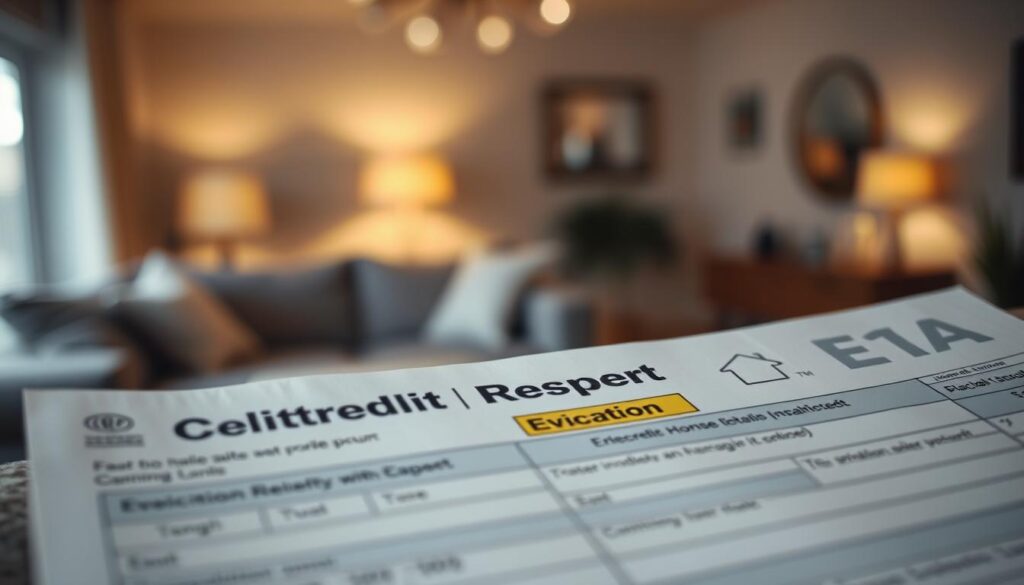An eviction on your credit report can be frustrating. It affects your credit score and future housing options. But don’t lose hope! You can remove an eviction from your credit report.
This guide will show you how to dispute wrong eviction records. You’ll learn to repair credit damage and clear your rental history. Take control of your financial future today.
Key Takeaways
- Understand the impact of evictions on your credit score and future housing opportunities.
- Learn the process to challenge and remove inaccurate eviction records from your credit report.
- Discover effective credit repair strategies to mitigate the consequences of an eviction judgment.
- Explore legal options for permanent eviction record removal and expungement.
- Develop a plan to rebuild your credit and secure future housing after an eviction.
Understanding the Impact of Evictions on Credit Reports
Evictions can severely damage your credit report. They affect your creditworthiness and make future housing or financing difficult. It’s vital to know how eviction records are reported and their consequences.
This knowledge is crucial for those aiming to remove eviction from credit report or repair their credit after an eviction.
Eviction Records and Their Effect on Credit Scores
Evictions are usually reported to major credit bureaus. They can stay on your credit report for up to seven years. This negative item can harm your credit score after eviction.
Evictions signal financial instability and unreliable payment history. More evictions on your record mean a bigger impact on your credit report correction.
The Consequences of an Eviction Judgment
An eviction judgment has lasting effects beyond your credit score. Landlords often use eviction records to screen potential tenants. This makes finding future housing challenging.
Eviction credit repair may be needed for loans, credit cards, or employment. Some employers consider evictions when making hiring decisions.
Understanding an eviction’s impact is key to eviction removed from credit report. By knowing the process and seeking solutions, you can rebuild your credit.

The Eviction Dispute Process: Challenging Inaccurate Records
You can dispute inaccurate eviction information on your credit report. This process involves gathering documents and filing a formal dispute with credit bureaus. The goal is to correct or remove erroneous information from your credit report.
Gathering Necessary Documentation
Start by collecting all relevant documents to support your case. This may include court records and letters from your former landlord. Evidence of reporting errors can also help.
A clear paper trail strengthens your dispute. It increases your chances of a successful outcome.
Filing a Dispute with Credit Bureaus
Submit a written letter to credit bureaus outlining the inaccuracy. Include your supporting evidence. Credit bureaus must investigate your dispute within 30 days.
They’ll contact the landlord or property manager who reported the eviction. If the landlord can’t provide evidence, the bureaus must remove the negative item.
Taking these steps can help correct your credit report and remove any inaccurate eviction records. This process is crucial for rebuilding your credit and improving your financial standing.

| Step | Action |
|---|---|
| 1 | Gather all relevant documentation, such as court records and evidence of errors. |
| 2 | Submit a written dispute to the credit bureaus, outlining the inaccuracy and providing supporting evidence. |
| 3 | The credit bureaus will investigate the dispute and contact the landlord or property management company. |
| 4 | If the landlord cannot provide evidence to support the eviction, the credit bureaus will remove the negative item from your credit report. |
eviction removed from credit report
An eviction on your credit report can be a major setback. However, there are ways to clear your record and improve your financial standing.
Working with Credit Bureaus
Disputing the eviction record with credit bureaus is a direct approach. Gather documentation showing the eviction was inaccurate or unjustified. Submit a formal dispute to the credit bureaus.
Credit bureaus must investigate and remove incorrect or unverifiable information. This process can help clear your record if the eviction was wrongly reported.
Negotiating with Landlords
Try negotiating with the landlord who initiated the eviction. If you reach an agreement, ask for the eviction record to be expunged or sealed.
Provide this documentation to the credit bureaus. They can then remove the eviction from your credit report.
Exploring Legal Options
For complex situations, consult a legal professional specializing in eviction removed from credit report or eviction history deletion. They can advise on specific laws and regulations in your state.
A lawyer can help navigate the process of getting the eviction record expunged or sealed. This expertise can be valuable in challenging cases.
| Strategy | Pros | Cons |
|---|---|---|
| Disputing with Credit Bureaus | Direct approach, credit bureaus legally obligated to investigate | May require extensive documentation, success not guaranteed |
| Negotiating with Landlords | Can lead to a mutually agreeable solution, landlord cooperation is key | Landlords may be unwilling to cooperate, negotiations can be complex |
| Seeking Legal Assistance | Expert guidance, knowledge of applicable laws and regulations | May incur legal fees, process can be time-consuming |
The path to eviction removed from credit report or eviction history deletion depends on your situation. Explore these strategies and seek the right resources.
Take necessary steps to reclaim your credit. With effort and the right approach, you can move forward with confidence.

Credit Repair Strategies for Eviction-Related Damage
An eviction can harm your credit report. It’s vital to take action to lessen the damage. Two key strategies can help: negotiating and seeking professional assistance.
Negotiating with Landlords and Property Managers
Reach out to your former landlord after an eviction. They might agree to remove the record from your credit report. This is more likely if the issue was out of your control.
Approach these talks with empathy. Provide relevant documents and show your commitment to solving the problem. This can lead to a solution that benefits both parties.
Seeking Professional Credit Repair Assistance
Complex eviction credit repair cases may need expert help. A reputable credit repair service can be a game-changer. They know how to handle credit report correction and eviction consequences credit issues.
These pros can dispute wrong information on your behalf. They also negotiate with creditors for you. Their skills can help you rebuild your creditworthiness.
“Addressing the impact of an eviction on your credit report is crucial for regaining financial stability and opening up future housing opportunities.”

You can overcome eviction challenges with the right strategies. Taking action and getting expert help can clean up your credit report. This paves the way for a brighter financial future.
Rebuilding Your Credit After an Eviction
Bouncing back from an eviction’s credit impact is tough but doable. The key is building positive credit history and showing responsible money management. Taking action can help you improve your credit score and access better housing options.
Establishing Positive Credit History
Start by rebuilding your credit foundation after an eviction. Consider these helpful strategies:
- Secure new housing: Find a landlord willing to rent to you. Paying rent on time will create a positive payment history.
- Utilize credit-building tools: Try secured credit cards or credit-builder loans. These can help show responsible credit use and boost your credit score after eviction.
- Monitor your credit report: Check your credit report often for accuracy. Dispute any errors that might hinder rebuilding credit after eviction.
- Prioritize on-time payments: Pay all bills on time. This includes utilities and new credit accounts.
These steps can help you rebuild your credit after eviction over time. With effort, you’ll regain financial stability and improve your credit standing.
“Credit recovery takes time, but with determination and smart strategies, you can overcome eviction challenges. You’ll build a strong financial future.”
Tenant Screening and Eviction Policies
Renting with an eviction history can be tough. Landlords use tenant screening and eviction policies to protect their investments. Knowing these practices helps you prepare for challenges.
Landlords worry about applicants with eviction history. It may suggest issues with rent payments or property damage. Some managers have a zero-tolerance policy for any eviction records.
| Screening Criteria | Potential Impact of Eviction |
|---|---|
| Credit Score | An eviction can negatively affect your credit score, making it more difficult to qualify for a rental unit. |
| Income and Employment | Landlords may be more hesitant to rent to applicants with a history of eviction, even if they meet the income and employment requirements. |
| References and Rental History | Landlords may contact previous landlords to inquire about any past eviction proceedings, which could jeopardize your chances of securing a new rental. |
Be open about your eviction history. Explain what happened and how you’ve improved your situation. Show landlords you’re now a responsible tenant.
Understanding these policies helps you navigate the rental market better. You can find a home that fits your situation.
The Eviction Consequences on Future Housing Opportunities
An eviction can greatly affect your future housing options. Landlords often check rental applications closely. Understanding the screening process is key to finding new housing after an eviction.
Understanding Landlord Screening Practices
Landlords usually do thorough background checks on potential tenants. They look at credit history and eviction records. An eviction on your credit report can be a big problem.
Landlords may see you as a risky tenant. They might worry about rent payments or property damage. This can make it hard to rent again.
- Landlords often rely on tenant screening services to assess applicants’ rental history and credit worthiness.
- Eviction records can remain on your credit report for up to 7 years, affecting your chances of approval for new rental agreements.
- Landlords may also consider factors such as your employment status, income, and references when evaluating your rental application.
To improve your chances, take steps to address past issues. Show you’re a reliable tenant. Try negotiating with past landlords and fixing your credit.
Provide strong references or proof of stable work. These actions can help you find new housing.
“The consequences of an eviction can linger for years, making it challenging to find a new place to call home. However, with the right strategies and determination, it is possible to overcome this hurdle and secure the housing you deserve.”
Learn about the screening process. Take steps to address eviction consequences credit. This can help you navigate the tenant screening eviction policy. You’ll have a better chance of finding a good rental.
Legal Options for Eviction Record Removal
An eviction record can be a major hurdle, but legal options exist to clear your name. Understanding the legal process is key to removing inaccurate judgments or expunging past evictions.
One main option is petitioning the court for record expungement. This involves proving the eviction record was wrong or causes undue hardship. Successfully petitioning may lead to sealing or removing the judgment.
- Gather all relevant documentation, including court records and any evidence supporting your case for expungement.
- File the appropriate petition or motion with the court, following the specific procedures and guidelines in your jurisdiction.
- Attend any required hearings and be prepared to present your case to the judge.
Other legal options may be available, depending on your case. If the eviction resulted from discrimination or rights violations, you might pursue damages or record removal.
The legal system can be complex. Consider seeking guidance from an experienced housing and credit attorney. They can help explore options and build a strong case for removing eviction judgments.
An attorney can also ensure your rights are protected throughout the eviction records removal process. Their expertise can be invaluable in navigating this challenging situation.
“Removing an eviction record can be a challenging process, but it’s often well worth the effort to reclaim your financial and housing opportunities.”
Conclusion
Evictions can severely impact credit reports, but there are ways to address this challenge. Removing an eviction from your credit record can help restore financial stability. It can also improve your chances of finding housing in the future.
Understanding the dispute process is crucial for clearing your rental history. Credit repair techniques and legal options can help rebuild your creditworthiness. Your credit report reflects your financial responsibility, so addressing inaccuracies is vital.
Take action to eviction removed from credit report, eviction credit repair, and credit report correction. With determination, you can overcome the eviction process. You’ll be ready to find new housing and secure your financial future.

